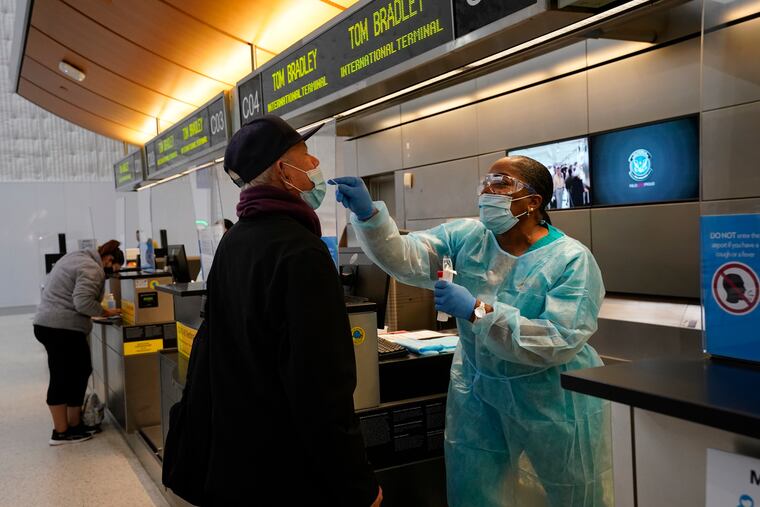FAA approves airport coronavirus screenings, paving way for first program to launch in Iowa
The airport in Cedar Rapids, Iowa, plans next week to begin screening passengers for symptoms of covid-19 before they go through security, implementing a first-of-its-kind plan.

The airport in Cedar Rapids, Iowa, plans next week to begin screening passengers for symptoms of covid-19 before they go through security, implementing a first-of-its-kind plan that was on hold for months while federal officials reviewed its funding.
The top executives of Eastern Iowa Airport wanted to use coronavirus relief money to check passengers for symptoms and won approval from local authorities in July. But airport revenue is strictly regulated, and the officials did not want to move forward without approval from the Federal Aviation Administration.
In late December, the agency gave its approval. The decision opens the door for the nation's 500-plus other airports to implement screening programs.
"We're excited to get this launched," said Marty Lenss, the director of the Cedar Rapids airport. "We've been working on it for a while. We have always looked at it as one more layer in a multilayered approach in restoring passenger confidence."
On Tuesday, Lenss said that fixtures for the screenings were being installed, and that staffers were being shown around before Monday's launch. The cost will be covered by a portion of the $23 million the airport received in coronavirus relief funding.
The mandatory screening would build on efforts by airlines to try to keep sick people off flights. Airlines typically require self-declarations and mask-wearing by passengers but do not conduct professional health screenings or require coronavirus testing of domestic passengers.
The United States on Jan. 26 is to require passengers arriving from other countries to have evidence of negative coronavirus testing, adopting a measure that has been in place in many countries for months.
And after the Trump administration moved Monday to end restrictions on travel from Brazil and much of Europe that day, Jen Psaki, the incoming White House press secretary, said the Biden administration had a different plan.
"On the advice of our medical team, the Administration does not intend to lift these restrictions on 1/26," she wrote on Twitter. "In fact, we plan to strengthen public health measures around international travel in order to further mitigate the spread of COVID-19."
In Cedar Rapids, screeners from a local health-care group, Mercy Medical Center, will ask travelers questions about their health and potential exposure to the coronavirus, and will take their temperatures. The first step should take 10 seconds.
Anyone who fails the initial screening will be subject to a second review, which Lenss said in a few weeks could include rapid testing. Those who seem sick would be urged not to travel and be referred back to their airline, which would make the final decision.
Tim Sagers, Mercy's medical director, said the program could be a model for other communities.
"We've seen that travelers around the country may be apprehensive about air travel," he said. "Our aim in this partnership is to provide further assurance that those who fly are as safe as possible."
In at least two cases, people have died of covid-19 aboard planes in the United States, and thousands are suspected of having been exposed to the novel coronavirus, the pathogen that can cause the disease, during air travel.
The value of screening people for the disease has become less clear because it can be readily spread by those who are infected but not displaying symptoms. The Centers for Disease Control and Prevention shut down screenings for some international passengers in September after detecting nine cases among 766,000 people who were screened.
Lenss said he recognizes that the program will not be perfect.
"I'm sure we're going to learn something," he said. "We've never seen this as a silver bullet by itself."
The FAA determined that the screenings would be a legitimate use of airport revenue as long as they were conducted by trained medical personnel and not offered to the public at large.
"Airports may voluntarily choose to take such actions in an attempt to jump-start and support the recovery of airport operations and airport services," the agency wrote in a guidance document.
Eastern Iowa Airport is relatively small, not ranking among the 100 busiest in the nation in a typical year. But it is served by three of the four major carriers, as well as by two low-cost airlines. American Airlines, United Airlines, Frontier Airlines and Allegiant Air expressed support for the program.
Hilarie Grey, a spokeswoman for Allegiant, said, "We look forward to seeing how it will work in the operational environment in the coming weeks."
In the new guidance, the FAA said airports should get the support of airlines and local health authorities before setting up screening programs.
Pramod Dwivedi, the director of public health for Linn County, where the Iowa airport is located, said authorities supported the program as a way of reducing the spread of the virus through air travel, saying in a statement that it is “instrumental in reducing air travel related COVID-19 transmissions.”